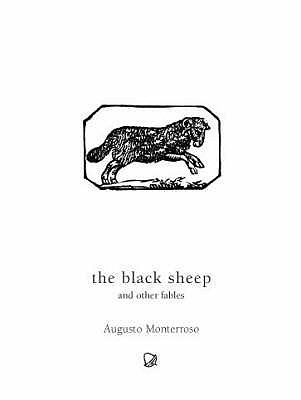To call him an unknown name is perhaps to do Augusto Monterroso a disservice, for while he may not be known in many English speaking circles, he’s a well known writer among Spanish speakers. An influential one too, considering the praise that this dinky edition of fables from Acorn Book Company, carries inside. Names such as Gabriel García Márquez, Maria Vargas Llosa, Carlos Fuentes – all familiar names in Latin American letters. Even Italo Calvino, citing Monterroso’s work as “the most beautiful stories in the world”, can’t hold back.
Monterroso’s seeming obscurity, in the face of better known names, is perhaps down to his output. He wrote, for the most part, short stories. Or, more apt, based on the array of titles in this slim volume, short-short stories. Indeed, he arguably lays claim to the shortest short story put to print, the single sentence The Dinosaur (“When he woke the dinosaur was still there.”)
This terse storytelling, where only the bare details are given, force the stories onto the reader’s imagination. Monterroso, however, isn’t just about le mot juste that allows him to skimp on the detail, but he’s also interested in subverting well known notions. In the opening fable he brings about the meeting of a rabbit and lion, the former fleeing while the latter roars and claws the air. Only, the lion is declared the coward, thanks to a psychoanalyst watching over and citing how this can be so.
Animals play a large part in The Black Sheep and Other Fables (1969), each recognisably human in their own way. In one story, The Owl Who Wanted To Save Humankind, Monterroso casts his net over the animal world and captures all this is human:
…he took to musing on the evident acts of wickedness that the Lion commits with his power; on the frailty of the Ant, who gets squashed flat every day, even when he is at his busiest; on the laughter of the Hyena, which is always out of place; on the Dove, who complains about the very air that sustains him in flight; on the Spider, who traps the Fly, and on the Fly, who with all his intelligence lets the Spider trap him; in short, on the whole range of defects that made Humankind so wretched…
In Penelope’s Cloth, or Who Is Deceiving Whom, there are no animals, and instead we get a retelling of the Ulysses myth, supposing that Ulysses hasn’t went off adventuring of his own volition, leaving Penelope at home, but was pushed. Other Classical figures featuring among the collection are Pygmalion and Achilles, cursing Zeno of Elea for his loss, in the philosophical race against the tortoise.
That the stories be considered fables may be a further subversion by Monterroso, being a far cry from the traditional moral tale popularly ascribed to Aesop. But in their brevity, they take on an all-knowing life of their own, sketching complex traits that can be coloured in with meaning. Even when there’s no physical life in the story, such as in The Lightning That Struck In The Same Place Twice, Monterroso forces emotion into the story, creating an unexpected depth, with the slightest of brush strokes:
Once there was a Flash of Lightning that struck in the same place twice. But it found that it had done enough damage the first time round and was no longer necessary, and it got very depressed.
In parallel to the thick vein of human understanding, there runs a strong sense of humour. The unexpected delight of The Monologue Of Evil, countered with the monologue of its opposite number, works extremely well; the satire of The Chameleon Who Ended Up Not Knowing What Colour To Turn expertly mocks politics; and one can just imagine Franz Kafka enjoying this twisting story:
Once there was a Cockroach called Gregor Samsa who dreamt he was a Cockroach called Franz Kafka who dreamt he was a writer who wrote about a clerk called Gregor Samsa who dreamt he was a Cockroach.
While the stories may be beautiful, to echo Calvino’s praise, the stories often feel too lightweight to truly enjoy. Marvel at, yes; ponder, yes; but enjoy? It’s hard to enjoy when they are over, almost before they’ve begun. Perhaps the brevity that makes them so influential in the Spanish speaking world, having been captured in their initial language, is their albatross in the English language, making Monterroso a sort of black sheep of Latin American literature: a hugely popular writer we hardly know. In the title fable the black sheep is shot to give sculptors a muse; the lack of Monterroso’s work in English, over a fifty year career, may be his sacrifice so that we get Márquez, Llosa, Fuentes, and the rest of the flock.

Congrats on a brilliant review of Monterroso’s collection of stories. Thanks to you, I’ve just ordered this volume from the library. As I’m trying to familiarize myself more with Latin American literature, I’m delighted to have discovered another Latin American author. Splendid work, Stewart.
Best,
Titania